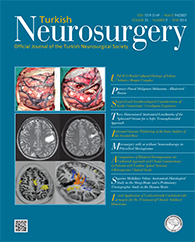2Nanjing Medical University Affiliated with Wuxi No.2 Hospital, Neuroscience Center, Wuxi, China DOI : 10.5137/1019-5149.JTN.9812-13.1 AIM: Human pituitary adenomas account for 10% of intracranial tumours and occur in about 20% of the population. They cause hypopituitarism or the compression of adjacent regional structures. However, little is known about the molecular pathogenesis that contributes to the development of these tumours.
MATERIAL and METHODS: In this study, we investigated the relationship between the expression level of folate receptor alpha and some clinical factors (endocrine, age, gender, repeated operation or not, mean diameter of tumour and invasiveness) of pituitary adenomas. Realtime fluorescent quantitative reverse transcriptase polymerase chain reaction was used to determine the expression of folate receptor alpha mRNA in pituitary adenomas and normal pituitaries. Folate receptor alpha protein levels were quantified using Western blot analysis and Immunohistochemistry.
RESULTS: We found folate receptor alpha mRNA and protein were significantly upregulated in clinically nonfunctional pituitary adenomas compared to functional tumours. For nonfunctional tumours, folate receptor alpha expression was much higher in the invasive group than in non-invasive group.
CNCLUSION: These results suggest that the overexpression of folate receptor alpha mRNA and protein by nonfunctional pituitary adenomas may facilitate the growth of these tumours. Potentially, this finding could be exploited to develop innovative molecular targeted diagnosis and treatment for human nonfunctional pituitary adenomas.
Keywords : Pituitary adenoma, Folate receptor alpha, Invasiveness, Targeted therapy




